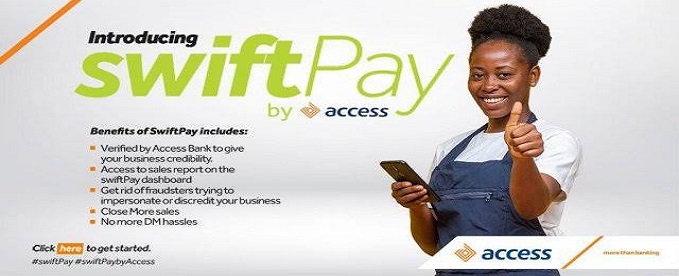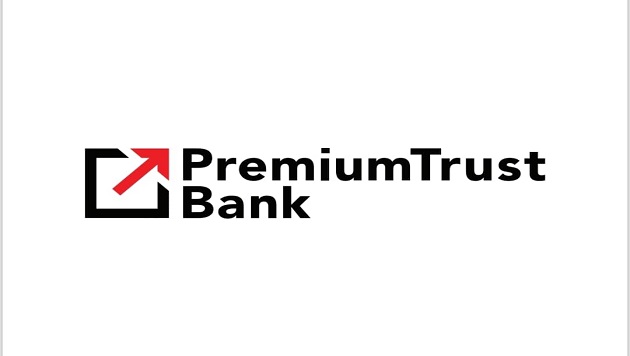E-Financial
Access Bank Unveils SWIFTPAY, Digital Payment Service for SMEs

Access bank Plc has unveiled SWIFTPAY, a digital payment service that facilitates the receipt of business payments by enabling customers make quick, easy and secure digital payments on social media platforms to merchants.

This is in the bid to facilitate payments between SMEs and their retail customers.
Ms. Ayodele Olojede, group, head, Emerging Businesses, Access Bank Plc, in a statement noted that the lockdown experienced in 2020 as a result of the COVID-19 pandemic, resulted in less in-person interactions and less in-person payment options.
She revealed that statistics from a survey carried out post-lockdown showed that MSMEs were impacted by cash flow, revenue and sales, adding that the impact of the pandemic made more apparent the lack of infrastructure and access to digital resources for small businesses.
She stated: “Access Bank has introduced SWIFTPAY to support the digital transition and growth of SME businesses. This product is part of the bank’s commitment to support SMEs to meet their business objectives despite the times.
“The new service comes in form of a payment link that can be hosted on merchants’ social media pages and sent to anyone to pay and conclude business transactions.
“It is easy and takes less than five minutes for interested merchants to sign up as it is convenient and time saving for everyone.”
Ayodele also revealed that the bank was committed to providing very practical solutions that support the growth of small business in Nigeria.
She added: “SWIFTPAY is free and the processing charge is discounted up to 15 per cent to ensure merchants keep most of their earnings.
“In recent times, e-Commerce has been challenged with the rise in fraud on social media, we have ensured that every merchant registered on SWIFTPAY carries a ‘verified by access ‘stamp to authenticate the page giving customers confidence when they transact.”
E-Financial
CBN Introduces AML to Fight Financial Terrorism, Gives Banks Deadline

Central Bank of Nigeria (CBN) has directed all financial institutions to implement real-time transaction alert systems as part of enhanced anti-money laundering (AML) compliance.

The directive was conveyed in a letter dated May 20, 2025, with reference number BSD/DIR/CON/AML/018/033, and titled “Exposure of Draft Baseline Standards for Automated Anti-Money Laundering (AML) Solutions – Request for Comments.”
The letter, signed by Olubukola Akinwunmi, director of banking supervision, was addressed to all financial institutions and outlines the regulatory expectations for modern AML compliance.
The apex bank emphasised that the initiative is part of its broader commitment to safeguarding the integrity and stability of Nigeria’s financial system, especially in the face of rapid digital transformation and the rise of innovative financial products.
The draft standards, which are now open to feedback from stakeholders, are designed to promote operational efficiency and ensure compliance with Anti-Money Laundering, Combating the Financing of Terrorism, and Counter-Proliferation Financing (AML/CFT/CPF) regulations.
“This standard is informed by a comprehensive assessment of existing solutions within the industry and aligns with global best practices, including recommendations by the Financial Action Task Force (FATF),” the document stated.
According to the CBN, the draft baseline standards are developed with key objectives in mind.
These include strengthening the AML capabilities of financial institutions through advanced, technology-driven solutions; encouraging the adoption of emerging technologies for real-time detection and reporting of suspicious transactions; reducing the inefficiencies associated with manual compliance processes; and ensuring alignment with evolving regulatory expectations both locally and internationally.
The draft document is available for download on the official website of the Central Bank of Nigeria, and all stakeholders have been encouraged to review and provide feedback.
“We look forward to receiving your valuable feedback,” the letter noted, highlighting the collaborative approach to shaping the final version of the standards.
Among the critical requirements outlined in the draft are real-time alerts for transactions considered high risk.
These include cross-border transactions, excessive cash deposits, cryptocurrency-related dealings, and other activities flagged under existing AML regulations.
The document specifies that the time taken to review and act on such alerts must not exceed a predetermined timeline, reinforcing the need for swift response and decision-making.
The CBN mandates that financial institutions implement transaction monitoring systems capable of supporting multiple risk scenarios.
These systems should use configurable filtration rules and customer segmentation techniques to effectively detect suspicious behavior. Institutions are also required to conduct regular stress testing and system validation exercises to minimise false positives.
“Each institution must define a predetermined threshold for false positives and ensure that the rate remains below this threshold,” the document stated, underlining the importance of maintaining a balance between alert sensitivity and accuracy.
The draft also mandates that AML solutions incorporate artificial intelligence and machine learning (AI/ML) capabilities.
These technologies should support anomaly detection, behavioral pattern recognition, automated risk scoring, and adaptive learning based on insights from previously flagged alerts and their resolutions.
The aim is to ensure that the systems not only detect suspicious activity but also evolve over time to become more efficient and accurate.
Real-time access to Customer Due Diligence (CDD), Know Your Customer (KYC), and Know Your Customer’s Business (KYB) data is another essential feature prescribed in the draft standards.
Financial institutions are expected to automate customer onboarding processes with real-time identification and verification in line with existing AML/CFT/CPF regulations.
This includes integration with Bank Verification Number (BVN) and National Identification Number (NIN) databases to ensure instant verification.
Moreover, the draft outlines the need for comprehensive KYC and KYB functionalities.
These must include automated customer risk profiling, transaction behaviour analysis, historical data tracking, and the inclusion of various risk factors derived from money laundering, terrorist financing, and proliferation financing risk assessments and typologies.
The solutions must also enable continuous classification of customers into risk categories to facilitate more targeted and effective risk management.
The Central Bank’s move to expose the draft for industry-wide input reflects its intention to build a robust, technologically advanced AML compliance culture across Nigerian financial institutions.
It signals a significant step towards enhancing transparency, operational efficiency, and international alignment in Nigeria’s financial regulatory environment.
E-Financial
Peter Obi Denies Secret Meeting with Tinubu over Fidelity Bank

Peter Obi, presidential candidate of Labour Party for 2023 elections, has publicly dismissed recent allegations linking him to a secret meeting with President Bola Tinubu over a fabricated debt scandal involving Fidelity Bank, describing the claims as “baseless, malicious, and entirely false.”

Peter Obi and Bola Tinubu
In a statement posted on his official X handle on Thursday, Obi expressed deep concern over what he called a growing business of blackmail targeting his public image.
“It’s obvious that the biggest business for blackmailers now is talking about Peter Obi from every negative perspective,” he wrote, adding that even his “solemn spiritual trip to Rome” had been twisted into a “blackmail campaign.”
Obi addressed a viral claim suggesting he travelled to Rome for a private meeting with President Tinubu in connection with a purported ₦225 billion debt crisis involving Fidelity Bank.
He categorically denied the allegation, clarifying the nature of his brief interaction with the President.
“I have never sought an audience with, nor met, President Tinubu since he assumed office,” Obi stated.
“Except (for a) one-minute meeting at the arena of Saint Peter’s Basilica, Rome during the inauguration Mass of Pope Leo XIV, where I was seated behind, and had to respectfully greet him and other dignitaries present.”
According to Obi, he was in Rome on May 9 for the lying-in state of Pope Francis and departed for London immediately after the Mass before returning to Nigeria.
The former Anambra State governor also refuted renewed claims that he owns Fidelity Bank.
He acknowledged his previous role as Chairman and Director of the bank, but emphasised that he does not own it.
“Fidelity has over 500,000 shareholders, none of whom hold a majority stake,” Obi explained.
“What this blackmailer seeks is to harm these hardworking Nigerians and cause them needless distress.”
He described the individual behind the allegations as a “self-proclaimed blackmailer-in-chief” and criticised the ongoing efforts to tarnish his reputation for political or financial gain.
Obi offered a prayer for those responsible for spreading falsehoods against him: “May God grant you the virtues of gratitude and understanding to know that we came here with nothing and will go with nothing, (and) that they cannot profit from their evil ways.”
E-Financial
PremiumTrust Bank Reassures Customers of Continued Security after Cyberattack Foil

PremiumTrust Bank, a Nigerian commercial bank, has reassured its customers of the maximum security of their funds after an attempted cyberattack on the bank was foiled by a law enforcement agency.

The bank said in a statement that the swift detection of the breach proves that its system functions precisely as intended, detecting, blocking, and escalating threats without compromising customer trust or data.
“In light of the recent release issued by the Economic and Financial Crimes Commission (EFCC) concerning an attempted cyberattack by some unscrupulous elements, PremiumTrust Bank wishes to reassure our valued customers, stakeholders, and the general banking public that our security architecture remains resilient,” the bank said.
“The attempt to gain unauthorised access to our database and infrastructure was swiftly detected and completely neutralised by our Internal Information Security and IT Surveillance Teams through real-time monitoring and advanced security protocols,” it added.
The bank revealed that the culprits are now facing trial at the Federal High Court, Lagos, as they were prevented from executing their “malicious plan”, underscoring the effectiveness, vigilance, and sophistication of PremiumTrust Bank’s cybersecurity framework.
The EFCC Lagos Zonal Directorate 1, on Tuesday, arraigned two employees of the bank, namely, Kehinde Odeyemi and Matthew Adeniyi Damilola, before Justice Alexander Owoeye of the Federal High Court in Ikoyi, Lagos.
They were arraigned alongside three others, Samson Latshin Dakup, Bolaji Omotosho Yinka, and Sunday Badeniyi Okunola, on a seven-count charge bordering on conspiracy to steal.
According to the EFCC, the defendants allegedly attempted to manipulate the bank’s server and domain credentials in an effort to gain unauthorised access to its database and steal customer funds. The commission said the planned fraudulent activity was intercepted before any loss occurred.
PremiumTrust Bank has, however, lauded the EFCC for its swift and highly professional response in not only foiling the cyberattack but also diligently tracking down the syndicate and their collaborators.
“We deeply value the Commission’s unwavering commitment towards safeguarding the integrity of Nigeria’s financial system.
“We remain unwavering in our duty to protect customers’ data and deposits, using a world-class, multilayered security infrastructure,” the bank said.
The lender encouraged customers to practice safe digital banking habits and remain vigilant even as it continues to invest in innovative cybersecurity solutions to prevent breaches.

 Telecom2 days ago
Telecom2 days agoTelcos Warn of Nationwide Telecom Blackout over Diesel Shortage

 E-Financial2 days ago
E-Financial2 days agoCBN, SEC Fine Access Holdings N1.21Bn for Infractions

 Telecom2 days ago
Telecom2 days agoNigerians Spend N5.3 Trillion on Telecom Services

 News2 days ago
News2 days agoKaspersky Uncovers Dero Crypto Miner Spreading via Exposed Container Environments

 E-Financial2 days ago
E-Financial2 days agoFirst Asset Management Launches N100 Billion Infrastructure Fund to Provide Sustainable Capital for Infrastructural Development Across Sectors

 Telecom2 days ago
Telecom2 days ago13 New Things Google Launched at I/O 2025

 Broadcasting2 days ago
Broadcasting2 days agoCanal+ Buyout Of South Africa’s MultiChoice one Step Closer

 General News2 days ago
General News2 days agoNigerians, Others Lost $70m to Denied Visas Applications to Europe in 2024




























